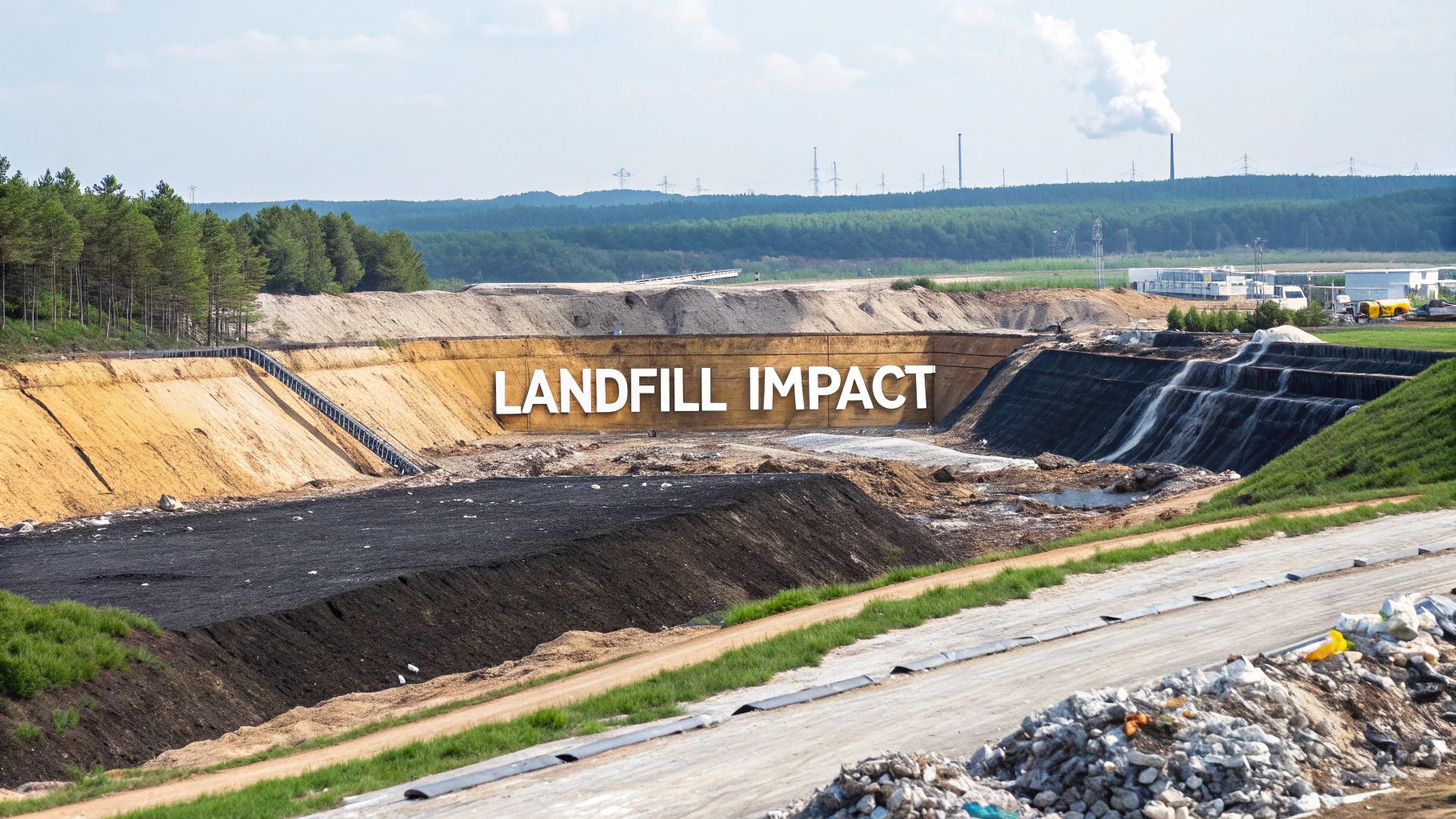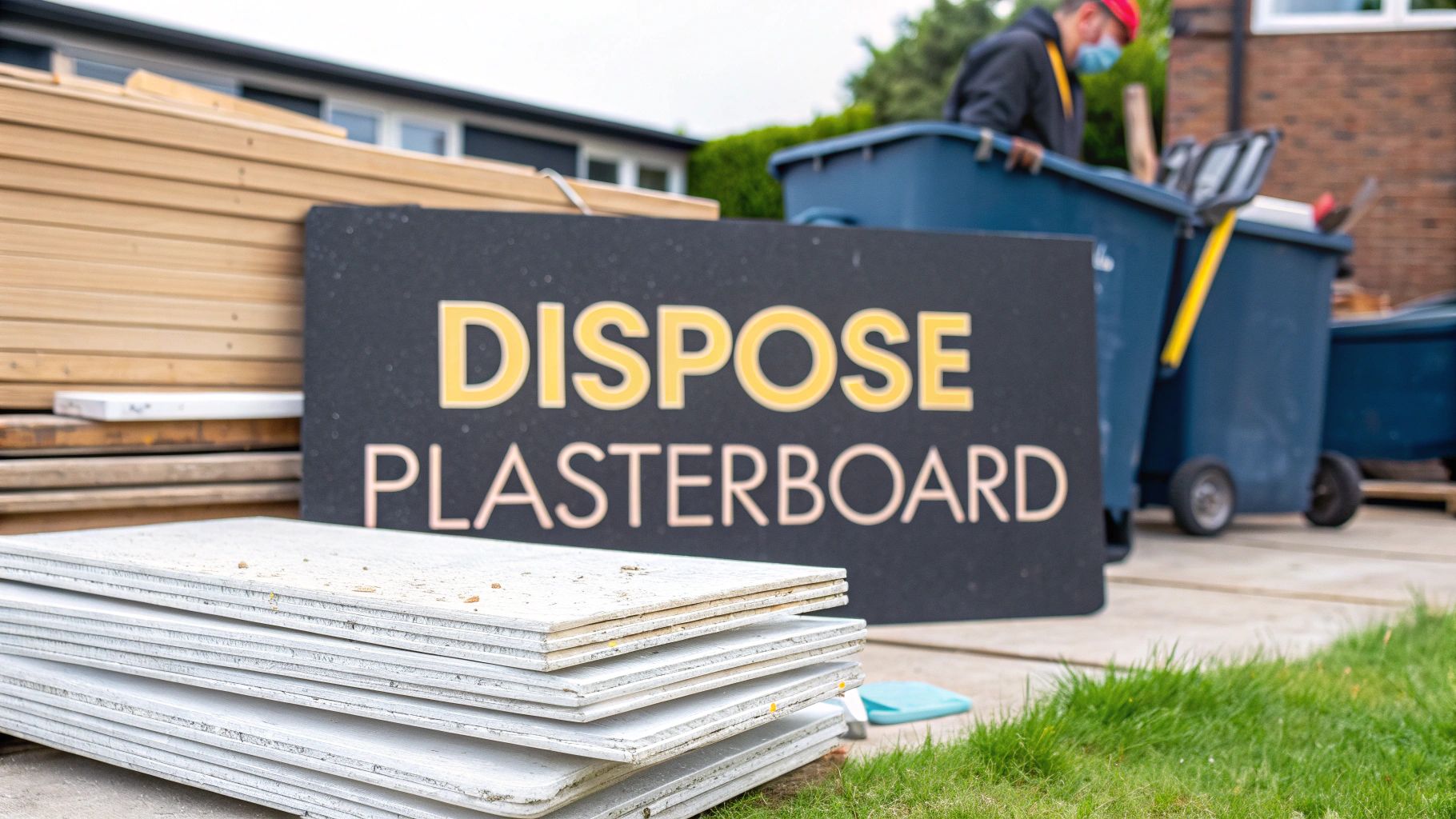The Ultimate Guide to Skip Hire in the UK (2025 Edition)
The Ultimate Guide to Skip Hire in the UK (2025 Edition)
Written by The Waste Group — your trusted local skip hire experts across Dorset, Bournemouth, Poole, Dorchester and the South West.
Environment Agency Waste Carrier, Broker & Dealer: CBDU113405
Whether you’re renovating a kitchen in Poole, clearing a garden in Bournemouth, or managing a full-scale building project in Dorchester, waste can build up quickly. Hiring a skip is still the simplest, safest and most compliant way to manage it — one delivery, one collection, and the waste is taken care of.
But many people still get caught out by rules around permits, access, weight limits, waste types and new 2025 recycling regulations. This guide covers everything you need to know so you can plan confidently and avoid unnecessary costs.
We’ve included local Dorset insights from our team, the latest landfill tax increases, 2025 price trends, and a breakdown of sizes to help you pick the right skip first time.
New for 2025: The UK landfill tax (standard rate) has increased to £126.15 per tonne. This makes recycling more important than ever — and why choosing a responsible skip provider matters.
📞 Ready to book? Call us on
01202 247716
or get an instant online quote below:
➡ Book a skip online at The Waste Group
All prices are fully transparent, with no hidden charges, weight traps or restricted categories.
1. How Skip Hire Works (Step-by-Step)
Skip hire is one of the simplest ways to manage waste from home projects, renovations, and commercial jobs. A licensed skip company delivers a skip to your chosen location, you fill it, and they collect it for sorting and recycling.
Here’s how the process works:
Choose your skip size
This will vary according to the nature of your waste. Heavy waste like rubble requires smaller skips (6–8 yards), while light bulky waste such as furniture or packaging is better suited to 10–12 yard skips.
Get a quote and book your skip
You can book online or call us directly. You’ll choose the delivery date, hire period, and whether you need a permit if placing your skip on a public road.
Skip delivery
We deliver to your chosen location. On private driveways we ensure safe access and stable ground. For public roads, we arrange the permit if required.
Fill your skip responsibly
Load evenly and only to the “fill line.” For safety reasons, overfilled skips cannot be transported. Avoid restricted items such as asbestos, fridges, tyres, and hazardous materials.
Collection and recycling
When your skip is ready, we collect it and process the waste at our recycling facility. We routinely recycle or recover approximately 98% of incoming material.
Local tip: In Bournemouth, Poole, and Dorchester where access can be tight, measure the space or send us a photo before booking to ensure smooth delivery.
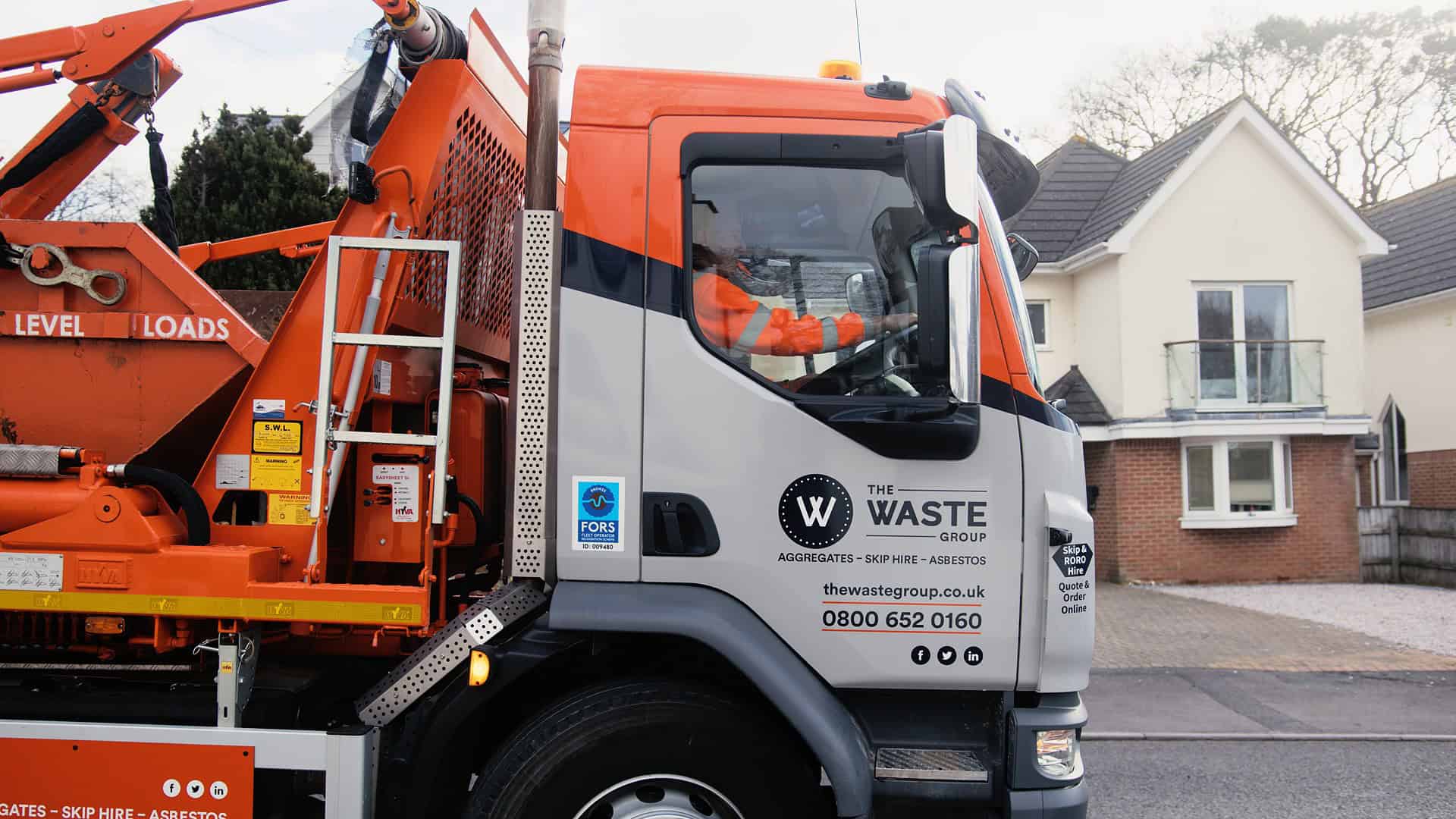
2. Skip Sizes Explained (with real-world examples)
Choosing the correct skip size saves you money, avoids overfilling, and keeps your project running smoothly. Below are the most common skip sizes used across the UK, along with examples of what they typically hold.
2–3 Yard Mini Skips
Ideal for small DIY projects, garden waste, and minor clear-outs. These skips hold around 20–30 bin bags and fit easily onto most driveways.
4 Yard Midi Skips
A good choice for bathroom rip-outs, small renovations, and moderate volumes of household waste. They hold around 30–40 bin bags.
6 Yard Builder’s Skips
Commonly used for soil, rubble, bricks, and heavier materials. Holds approximately 50–60 bin bags. Perfect for most trade work and medium-sized home projects.
8 Yard Builder’s Skips
The UK’s most widely hired skip size. Suitable for renovations, bulkier household waste, and mixed construction materials. Around 60–80 bin bag capacity.
10–12 Yard Large Skips
Great for lighter, bulkier waste such as furniture, wood, packaging and non-dense materials. Not suitable for soil or hardcore due to weight limits.
Local tip:
In Dorset, Poole and Bournemouth, driveways can be narrow. If you’re unsure whether the skip will fit, send us a quick photo by email or WhatsApp before booking.
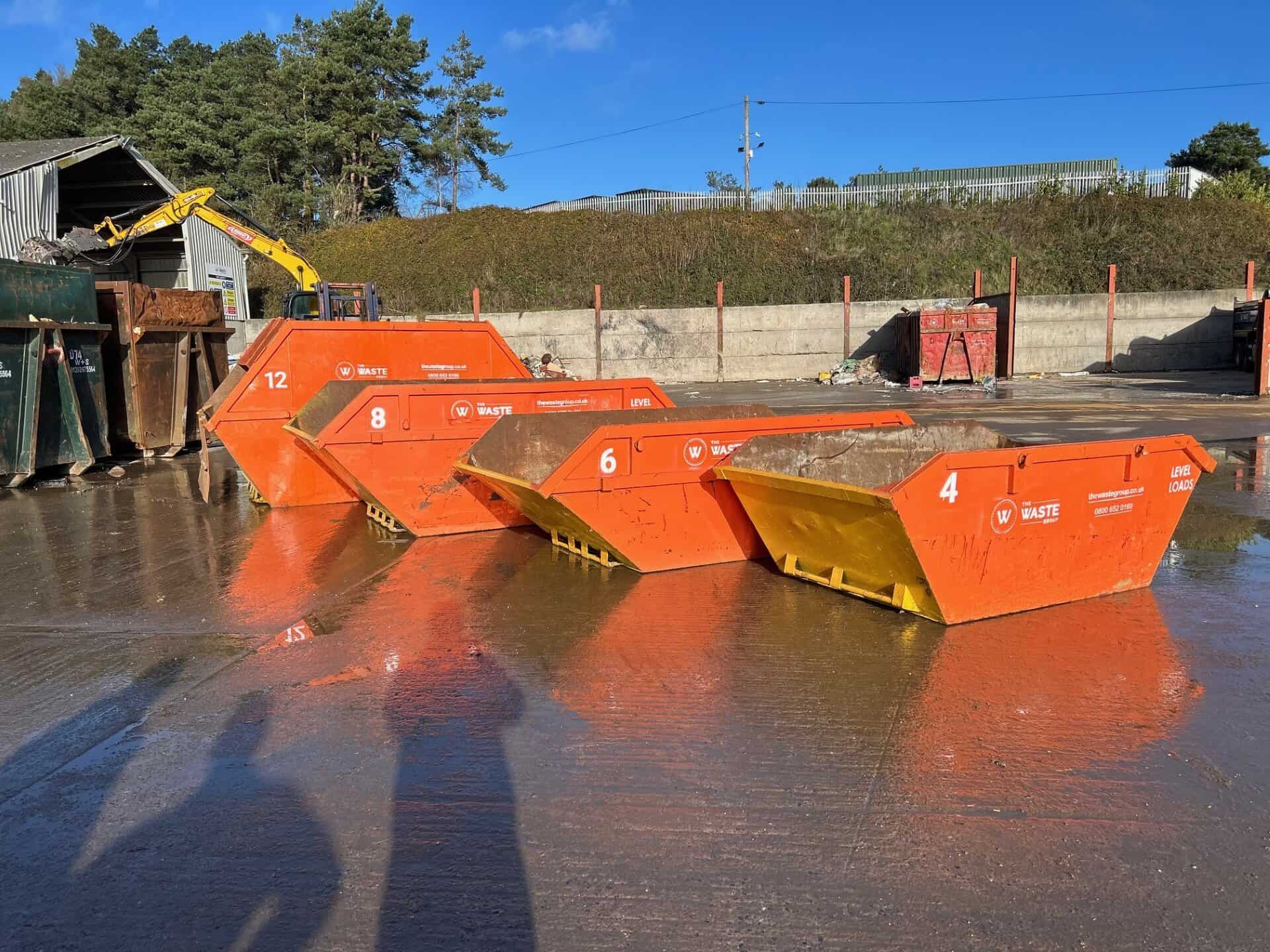
3. Weight, Density & Practical Access Considerations
Not all waste weighs the same. Two skips filled to the top can look identical, yet one may exceed the legal transport weight while the other is well within limits. Understanding weight and density helps you choose the correct skip size and avoid delays.
Heavy, Dense Waste
Materials like soil, rubble, clay, bricks and concrete are extremely dense. These should only be placed in 4, 6 or 8-yard skips. Larger skips become too heavy to lift safely when filled with this type of waste.
Light, Bulky Waste
Items such as furniture, packaging, wood, plastics and general household waste have a much lower density. These can go into 10 or 12-yard skips because they fill the space long before reaching weight limits.
Mixed Waste Loads
If you’re dealing with a renovation that includes both heavy material and lighter items, consider a combination of skip sizes or keep the heavier waste separate. This prevents overloading and keeps collection simple.
Access Considerations
Before booking, make sure there is clear access for the skip lorry. We typically need around 3 metres in width for safe access. Overhanging branches, parked cars or narrow driveways may require a smaller skip or an alternative placement.
Local tip: For tight roads in Dorchester and Poole, sending us a quick photo of the access area can help ensure the correct skip size and delivery method.
4. Skip Hire Prices in the UK (2025)
Skip hire costs vary depending on skip size, material type, access, permits, and the length of hire (normally 7–14 days). Here’s what you can expect to pay across the UK in 2025:
- 4 Yard Skip: £250–£300
- 6 Yard Builder’s Skip: £300–£375
- 8 Yard Builder’s Skip: £350–£450
- 12 Yard Large Skip: £500–£600
- RORO (20–40 yd³): Quoted individually based on weight, location and haul distance
Across Dorset and the South West, prices generally sit in the middle of these ranges. A standard 6-yard builder’s skip, for example, typically costs about the same as two council bulky-waste collections but offers faster turnaround and far greater capacity.
This year’s increase in landfill tax has encouraged many local operators to invest more heavily in recycling.
Still unsure which skip size you need? You can view photos of each skip size on our website and read more about their specifications.
If you have any doubts, give us a call. We can carry out a quick two-minute size estimation to help you choose the right skip.
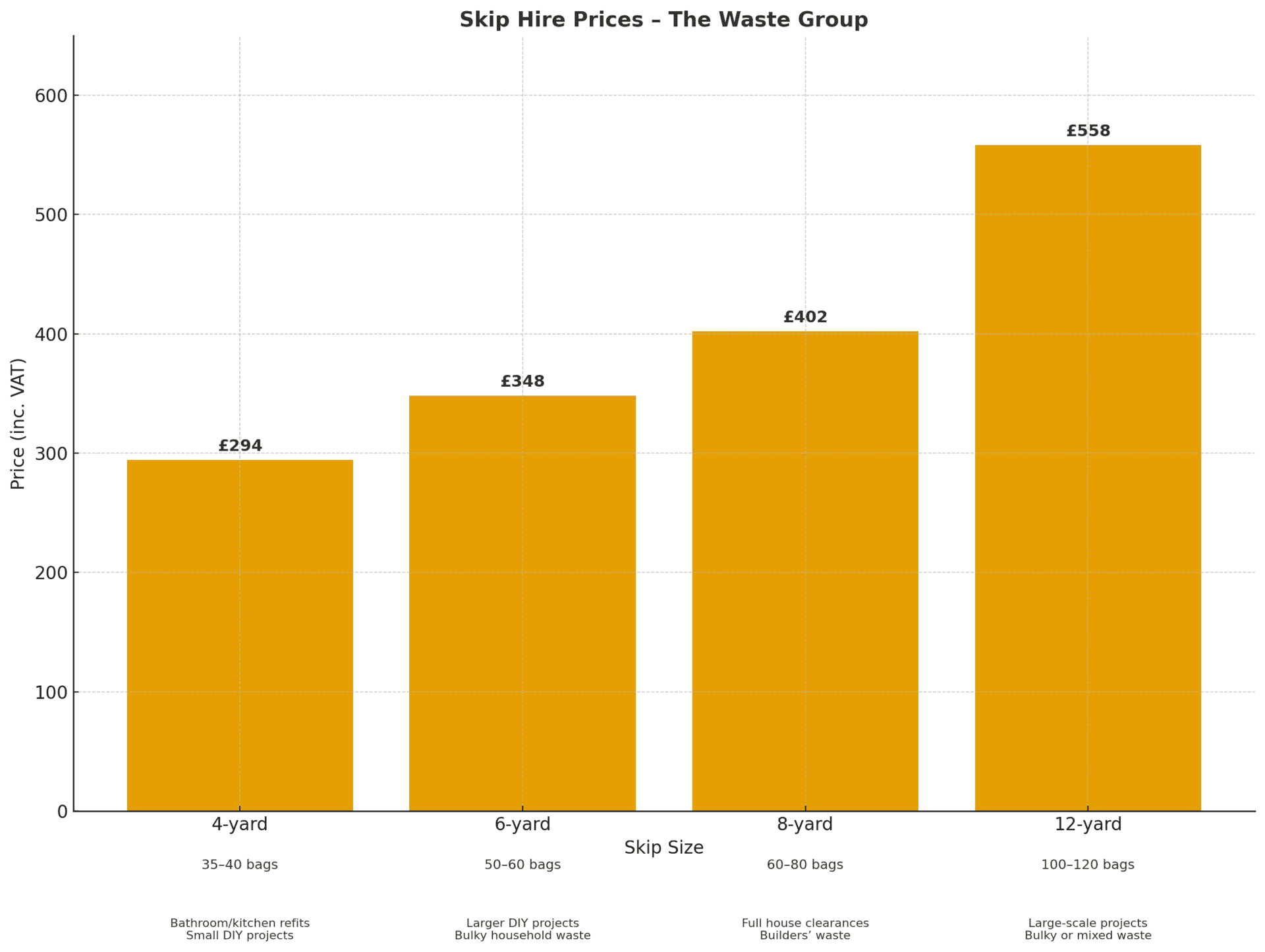
5. What You Can and Can’t Put in a Skip
Skips are designed for a wide range of household, construction and commercial waste, but there are important restrictions based on UK waste legislation. Knowing what can and can’t go in a skip helps you avoid delays, extra charges, or needing additional waste services.
✔ What You Can Put in a Skip
- Wood, MDF and timber
- Metal and scrap materials
- Soil, sand, clay, rubble and hardcore
- Furniture, mattresses and bulky household items
- Garden waste (branches, grass, plants)
- Plastics, cardboard and packaging
- Non-electrical household items
❌ What You Cannot Put in a Skip
- Asbestos (specialist removal required)
- Plasterboard (unless pre-booked separately)
- Electrical items (WEEE waste)
- Paint, solvents, adhesives and chemicals
- Gas bottles or pressurised containers
- Medical or clinical waste
- Tyres and batteries
If you’re ever unsure about a material, just call our team. We’ll confirm instantly whether it’s allowed, and if not, advise on the correct disposal method.
💡 Internal guide: For a full breakdown, see our related article here: What Can and Can’t Go in a Skip.
Local tip: Dorset councils are increasingly strict about plasterboard and WEEE items. Keeping these separate avoids contamination and additional charges.
5. What You Can and Can’t Put in a Skip
Skips are designed for a wide range of household, construction and commercial waste, but there are important restrictions based on UK waste legislation. Knowing what can and can’t go in a skip helps you avoid delays, extra charges, or needing additional waste services.
✔ What You Can Put in a Skip
- Wood, MDF and timber
- Metal and scrap materials
- Soil, sand, clay, rubble and hardcore
- Furniture, mattresses and bulky household items
- Garden waste (branches, grass, plants)
- Plastics, cardboard and packaging
- Non-electrical household items
❌ What You Cannot Put in a Skip
- Asbestos (specialist removal required)
- Plasterboard (unless pre-booked separately)
- Electrical items (WEEE waste)
- Paint, solvents, adhesives and chemicals
- Gas bottles or pressurised containers
- Medical or clinical waste
- Tyres and batteries
If you’re ever unsure about a material, just call our team. We’ll confirm instantly whether it’s allowed, and if not, advise on the correct disposal method.
💡 Internal guide: For a full breakdown, see our related article here: What Can and Can’t Go in a Skip.
Local tip: Dorset councils are increasingly strict about plasterboard and WEEE items. Keeping these separate avoids contamination and additional charges.
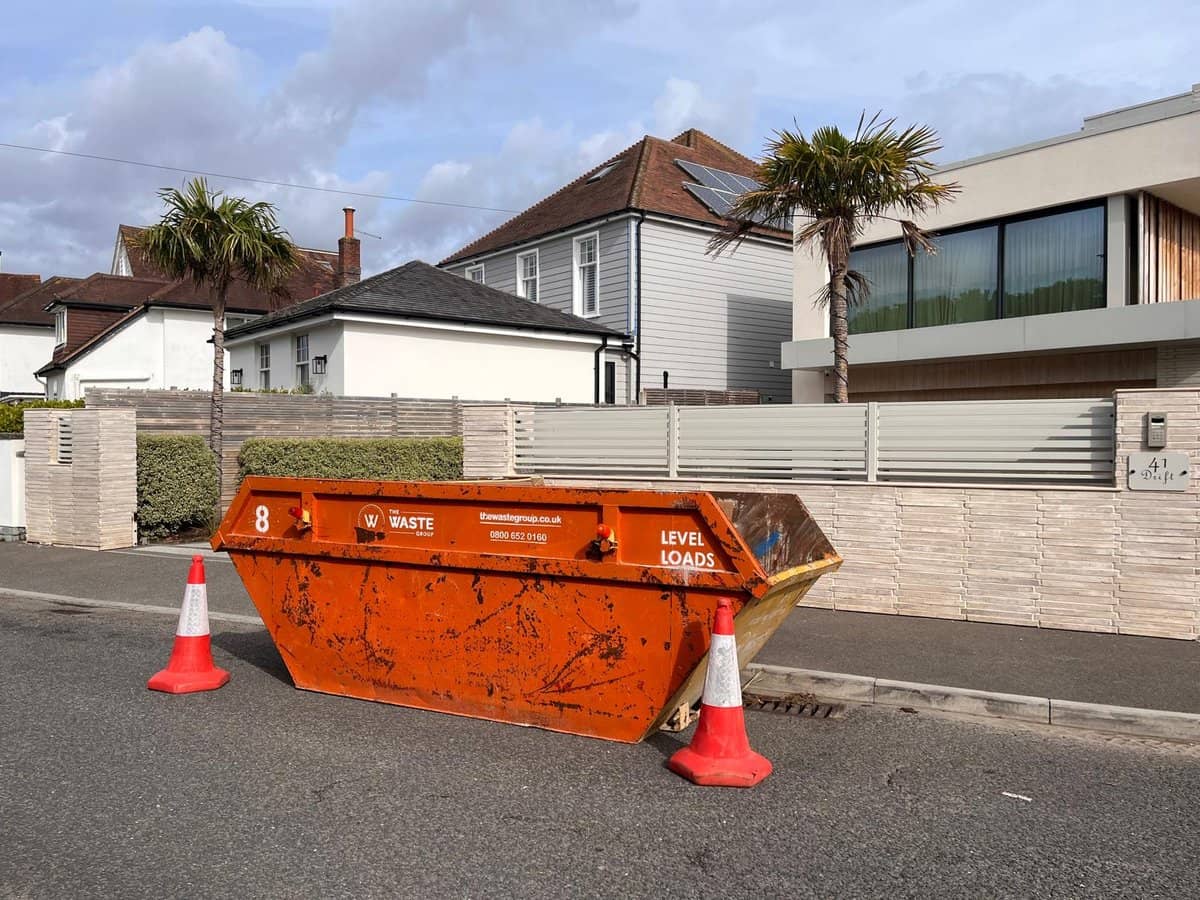
8. Recycling & Eco-Friendly Skip Hire
What happens to your waste after collection matters just as much as how you load it. Responsible skip hire underpins the UK’s recycling system. Once a skip is collected, its contents are taken to a licensed waste facility where materials are sorted, recovered and recycled wherever possible.
Typical recycling routes include:
- Wood: chipped and used for biomass fuel or panelboard production.
- Metal: separated, graded and sent for smelting and reuse.
- Soil & hardcore: screened and crushed into recycled aggregate.
- Plastics & cardboard: graded, baled and supplied to specialist recycling partners.
At The Waste Group, we routinely recover around 98% of the material handled at our Bournemouth-area facility. Using a local operator helps cut travel miles and supports regional processing rather than relying on long-distance haulage.
Eco tip: If you can keep plasterboard, soil and hardcore separate where possible, it usually improves recovery rates and keeps disposal costs down.
In short, good source-separation and local processing reduce both cost and carbon footprint.
9. What New Waste-Separation Rules Mean for Skip Hire
From 31 March 2025, new government rules made it mandatory for many businesses and organisations with 10 or more full-time equivalent employees to separate key waste streams, including dry recyclables and food waste. This affects how some customers can use skips for mixed loads.
For commercial skip users, this means you may need to keep certain recyclables separate, or use different containers for food and general waste, so that skip loads are not permanently mixed with materials that must be separated by law.
Skip hire companies must demonstrate compliance and record data correctly. Disposal facilities are increasingly strict and may reject loads that contain the wrong mix of waste streams or apply contamination charges if rules are ignored.
For domestic clients, the impact is less direct, but if you are clearing a mixed-use property (for example, a flat above a shop) it’s worth checking whether the business separation rules apply.
If you’re unsure how the regulations affect your project, contact us before booking and we’ll advise on the most compliant and cost-effective setup.
10. How to Choose a Skip Hire Company
Not all skip hire companies operate to the same standard. A little due diligence upfront helps you avoid unexpected costs, poor service or non-compliant disposal.
Licensing & insurance
Always check that your chosen operator is registered as an Environment Agency Upper Tier Waste Carrier, Broker & Dealer and holds the correct insurance. Our registration number is CBDU113405. You can verify any operator on the Environment Agency’s public register.
Recycling performance
Ask what percentage of waste they recover or recycle and where it is processed. We typically achieve around 98% recovery using local facilities.
Transparent pricing
Be wary of prices that seem very low but exclude certain waste categories, add hidden overweight fees, or leave permits out of the quote. Look for a clear list of what’s included.
Local reputation
Check recent Google reviews and recommendations from people in your area. Local operators usually offer faster delivery and a better understanding of access constraints and council rules.
Customer support
Good providers will give straightforward guidance on size selection, permits, timings and restricted items rather than leaving you to guess.
Why choose The Waste Group?
We’re a Dorset-based business serving Bournemouth, Poole, Dorchester, Christchurch, Wareham, Swanage, Ringwood, Verwood and Ferndown. Our team handles delivery, collection, recycling and permits so you can focus on the job, not the waste.
We’re proud to be highly rated by customers across the South West for reliability, communication and recycling performance.
11. Legal Compliance & Documentation You Should Expect
When you hire a skip, you are responsible for ensuring your waste is handled legally. Working with a reputable operator makes this easy, but it’s still important to understand what documentation should be in place.
For each skip load collected, you should expect:
- A Waste Transfer Note (WTN): detailing the producer (you or your business), the carrier, the type of waste, where it is going and the date of transfer.
- Evidence of the carrier’s licence: most operators display their Environment Agency registration number on their website and paperwork. Make sure the number matches the official record.
- Site plan or delivery details: especially where a skip is placed on the public highway under permit.
- Recycling information: many professional operators can provide a summary report or certificate showing recovery percentages for your load or project.
If you fail to use a properly licensed carrier or keep adequate records, you may still be held responsible if your waste is mismanaged. Many Environment Agency enforcement cases arise from poor documentation rather than deliberate wrongdoing.
To stay compliant, keep digital copies of your carrier’s licence, Waste Transfer Notes and any recycling reports for your records.
12. Frequently Asked Questions
How long can I keep a skip?
Standard hire is usually 7–14 days, but longer periods can be arranged by request.
Do I need a permit on my driveway?
No. Permits only apply if the skip is placed on a public road or pavement. Driveway or private land placements don’t normally require a permit.
Can I mix waste types?
You can mix general household and construction waste in the same skip, but you must keep out hazardous, electrical and other prohibited items listed in this guide.
What happens to my waste once it’s collected?
Your waste is taken to a licensed facility where it is sorted; a high percentage (around 98% for us) is recycled or recovered, with only a small fraction going to landfill.
What size skip do I need for a kitchen renovation?
Heavy items such as tiles, bricks and rubble usually suit a 6–8 yard builder’s skip, while lighter but bulky items such as cabinets, packaging and insulation are better in a 10–12 yard skip.
Quick reminder: if you’re not sure, give The Waste Group a call. A quick two-minute sizing check can help you avoid ordering a skip that is too small or unnecessarily large.
13. Cost-Efficient & Waste-Minimising Strategies
Skip hire becomes noticeably cheaper when you plan it as part of the project rather than an afterthought. A few small changes can save £50–£100 or more on a typical job.
- Separate by weight and bulk: keep light packaging or timber separate from dense materials like rubble and soil. Mixing them often pushes you over weight limits and can incur surcharges.
- Share space where possible: where appropriate, neighbours or contractors working nearby can share a larger skip and split the cost. This can work well for overlapping clear-outs or refurbishments.
- Photograph each stage: taking a quick photo at drop-off and collection helps document fill level and condition, which can prevent disputes about overloading.
- Send a site photo before booking: a simple picture of your driveway or access route lets us confirm lorry clearance and avoid avoidable delays.
- Book flexible collection: choosing “collect when full” or confirming a window for collection means you’re less likely to pay for unused hire days if your project finishes early.
A bit of planning turns skip hire from a routine cost into a controlled part of your project budget, and helps keep things safe, efficient and compliant.
14. Book a Skip in Dorset & the South West
The Waste Group provides quick, professional skip hire across Dorset and the surrounding areas, including Bournemouth, Poole, Dorchester, Christchurch, Wareham, Swanage, Ringwood, Verwood and Ferndown.
📞 Call us: 01202 247716
💻 Book online: Get an instant quote and book your skip
Book online in minutes. We confirm access, permits and timings quickly so your project can stay on schedule.
If you find the same skip for the same postcode at a cheaper price elsewhere, let us know and we’ll match it.
Join thousands of satisfied customers who trust The Waste Group for reliable, transparent and eco-conscious skip hire across the South West.
